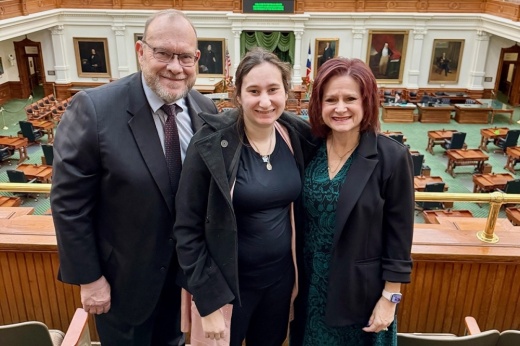When Carey Handley attended a 2008 seminar at The Harris Center, a local behavioral health authority, she learned that adults with disabilities can access Medicaid services, but only after spending over a decade on a waitlist.
That revelation sparked Carey Handley’s yearslong advocacy journey, which culminated in the filing of House Bill 1188—The Caytlin Handley Act, named after her daughter—during the ongoing 89th Texas Legislature.
The bill aims to ensure that families of children like Caytlin Handley—who has an intellectual and developmental disability—receive timely, consistent information through referrals to their local IDD authorities when eligibility for special education and an IDD diagnosis is determined by a school. It would require schools to share this information at the first Admission, Review, and Dismissal, or ARD, meeting when campus-based special education teams determine a student's diagnosis, Carey Handley said.
With less than 30 days before the legislative session ends June 2, Carey Handley said the bill could be a game changer by connecting families to vital resources much earlier, and helping them prepare for their child’s adulthood with more clarity and support.
“This whole bill is about the consistency of getting this information out to the people who need it the most,” she said.
Why it matters
Many adults with IDDs are unable to secure adequate health insurance through employment or wages after aging out of Medicaid at age 21 or special education programming through public schools, said Dr. Karen Jaggers, a Katy-based clinical psychologist with The Jaggers Group, who works with people with autism.
In addition to long waitlists to access Medicaid in adulthood, many are denied the first time they are evaluated by state administrators, Jaggers said. This can leave gaps in their care and socialization.
“It’s shocking how many young adults I’ve seen that absolutely should qualify for [Medicaid], but they’re denied it,” Jaggers said. “There’s no chance they could support themselves, but they’re still denied.”
The Texas Education Agency requires school administrators to present parents whose children are enrolled in special education programs with information regarding adult transitioning during a student’s annual review of their individualized education program plan, when they are 14 years old, according to legislative documents.
Resources that can aid with the application include waiver programs, referral networks and local authorities, such as IDD authority Texana Center and nonprofit The Arc of Fort Bend County, Karri Axtell, program director for The Arc of Fort Bend County, said at the May 10 Fort Bend ISD Adult Transition Fair.
The Medicaid waitlist for adults with IDD can be anywhere from 15 to 20 years long, Axtell said.
This delay in connecting families to local IDD authorities can cause many families to miss early windows for services because they don’t know a waiting list exists, Carey Handley said. HB 1188, filed by Rep. Christian Manuel, D-Port Arthur, aims to prevent that by making information delivery consistent and standardized, ensuring families can make informed choices at the right time, she said.

Carey Handley said she worked with lawmakers to introduce the bill in 2022, but it stalled in the Senate due to timing and the high bill number.
The second time the bill was filed in the 89th Legislature as HB 1188, she took a more strategic approach by setting meetings, creating advocacy packets and enlisting the help of her daughter, whose presence and thank-you notes “endeared” the legislators, she said.
"Caytlin is the reason this bill exists,” Carey Handley said. “She walked into those offices and made them care. She put a face on the issue.”
Now a young adult, Caytlin Handley testified before the House Public Education Committee as a self-advocate for the first time on April 8—a decision made just the night before, Carey Handley said. She said Caytlin Handley’s testimony moved lawmakers to tears.
HB 1188 passed the House on April 24 by a near-unanimous vote, and the House public education committee officially renamed it The Caytlin Handley Act, according to Legislature documents.
“The bill is important to me because I want to help people that have disabilities like I do,” Caytlin Handley said in an interview after her April 8 testimony. “One family can make a difference.”

The Senate passed the bill May 16 with a unanimous vote, according to the Texas Legislature website. The bill still has to be signed by Gov. Greg Abbott before becoming law.





